Laser eye surgery claims are for the damage done to your eyes due to medical negligence by the eye surgeon and team.
You trust an eye surgeon to do a professional job with your laser eye surgery. What you do not expect is medical negligence and surgery below acceptable standards.
A claim for laser eye surgery negligence is to get compensation for the harm done to your eyes, and for the financial and emotional effect it has on your life.
Your No Win No Fee medical negligence solicitor will seek the compensation from the negligent party and get you the money you deserve for the suffering caused.
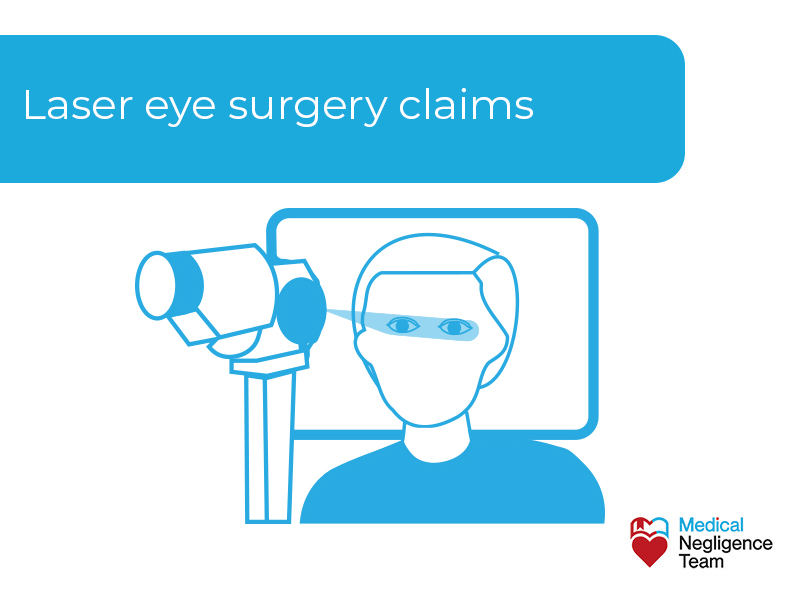
Table of content
What is laser eye surgery negligence?
Laser eye surgery negligence is less than professional-level surgery on your eyes by a doctor. Instead of doing a professional job on your eye surgery, they perform at a standard of care below that no other laser eye surgeon would provide.
Laser eye surgery is a very precise surgery to correct any one of many issues with your eyes. It is a type of eye surgery which can reduce the danger of complications and your time in recovery.
When laser eye surgery goes wrong, it can cause irreversible damage. The patient could suffer from further eye complications for life, and some people can lose their sight.
The potential laser eye surgery complications form part of every laser eye surgery compensation claim for medical negligence.
Potential laser eye surgery complications
Potential laser eye surgery complications range from infection to over-correction and even under-correction of an eyesight issue.
The laser eye surgeon must be fully trained in the equipment they are using. They should also be fully informed of the patient and the surgery they are performing on their eyes. Laser eye surgery complications happen due to negligence and are preventable.
Potential laser eye surgery complications are:
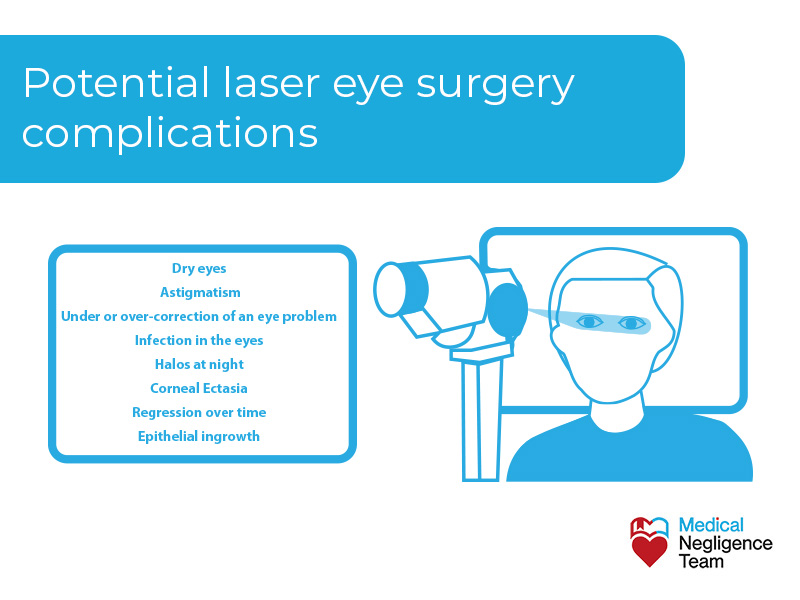
Dry eyes from laser surgery
Dry eyes from laser surgery can happen in one or both of your eyes. The laser eye surgeon damages the tear ducts during surgery, causing a temporary or long-term reduction in moisture production.
Astigmatism resulting from laser eye surgery
Astigmatism resulting from laser eye surgery is the blurred vision caused by the laser equipment damaging the cornea. The cornea becomes misshapen and affects your vision.
You may need to undergo further surgery to correct the issue and spend more time in medical care.
Under or over-correction of an eye problem
Under or over-correction of an eye problem due to laser surgery negligence happens when the surgeon takes too much tissue away when operating on your eyes.
Instead of improving your eye problems, the surgeon leaves you with even worse sight than before the surgery.
Infection in the eyes
Infection in the eyes is a rare event but can happen with laser surgery if the surgery team leave you open to it.
Eye infections can spread quickly and do a lot of damage if not treated as soon as they are diagnosed.
Halos at night
Halos at night after laser eye surgery is when there is a glow, or halo, around lights when outside at night.
The condition can affect both of your eyes and leave it very hard to see at night, especially in towns and cities.
The halos make driving difficult and can be very disorientating.
Corneal Ectasia
Corneal Ectasia is vision loss due to a weakening of the cornea after poorly performed laser eye surgery.
The laser eye surgeon does severe damage to the eye, causing a bulging in the cornea and a gradual loss of vision.
Regression over time
Regression over time is when the effects of laser eye surgery fade away after a period of weeks or months.
The benefit of the laser eye surgery is lost as the poorly performed operation was unsuccessful.
Epithelial ingrowth
Epithelial ingrowth after laser eye surgery is where the cells around the edge of the cornea begin to grow under it, causing vision loss.
Instead of correcting your eye problem with laser surgery, the surgeon has caused it to get worse, and if left untreated, the growth could cause blindness in that eye.
How much can I claim in compensation for laser eye surgery negligence?
You can claim compensation for laser eye surgery negligence amounts from the low £1,000s to over £1 million in some cases.
How much compensation you may receive depends on several factors, and laser eye surgery claims sometimes see very high awards.
Compensation amounts in laser eye surgery negligence claims can be:
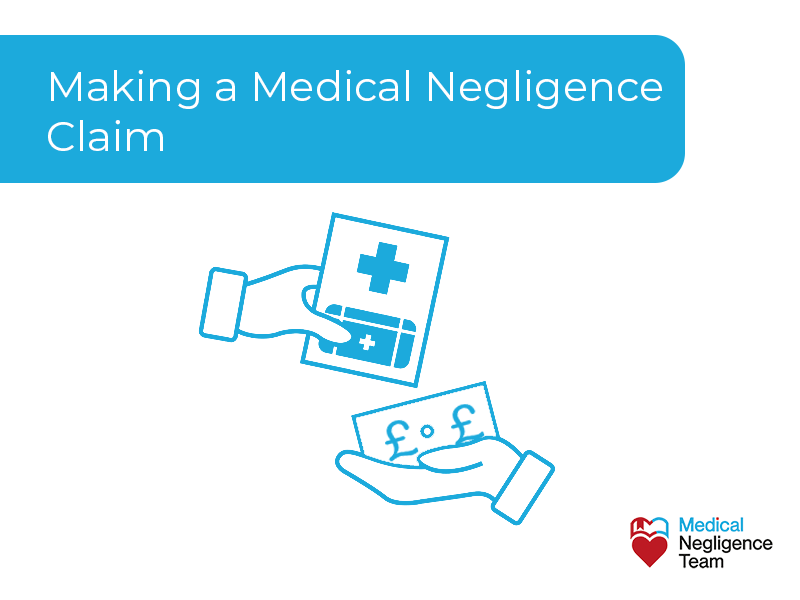
All amounts are approximate and are only a guide to what is possible in laser eye surgery negligence claims.
As in all medical negligence claims, each case is dealt with on merit and how much you suffer due to the laser eye surgery.
A No Win No Fee medical negligence solicitor will be the only one who can advise you on a laser eye surgery negligence claim. They will know from experience what your case may be worth and how to make a successful claim.
Your No Win No Fee medical negligence solicitor will handle your laser eye surgery negligence claim for compensation and for all damages incurred.
Who is at fault for laser eye surgery negligence?
A medical professional is at fault for your laser eye surgery negligence. Instead of carrying out the laser eye surgery to the expected high standard, they have been negligent in their duty of care, and you, the patient, will suffer.
Medical negligence is treatment below an acceptable standard by a medical professional. Instead of putting the care needed into a very sensitive laser eye surgery, they have done damage, which is clear medical negligence.
You may need to undergo years of treatment to correct the errors of laser eye surgery negligence. By behaving less-than-professionally, the doctor puts your sight at risk, which is frightening for you.
Poorly performed laser eye surgery is medical negligence.
When you notice the signs that your laser eye surgery has gone wrong, you can claim compensation for the medical negligence.
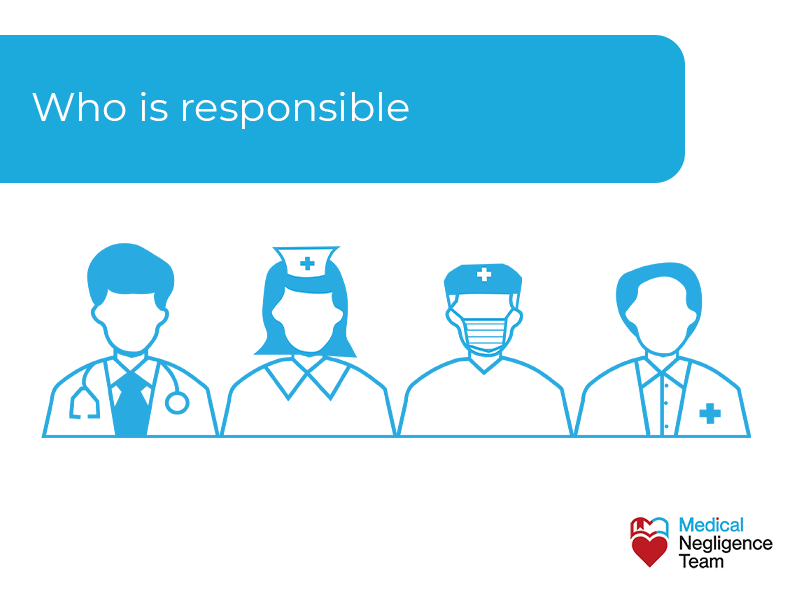
Signs your laser surgery has gone wrong
Signs your laser eye surgery has gone wrong can be astigmatism, halos with lights at night and dry eyes. You may notice the signs that your laser eye surgery has gone wrong not long after the procedure or maybe a year or so later.
Signs your laser surgery has gone wrong are:
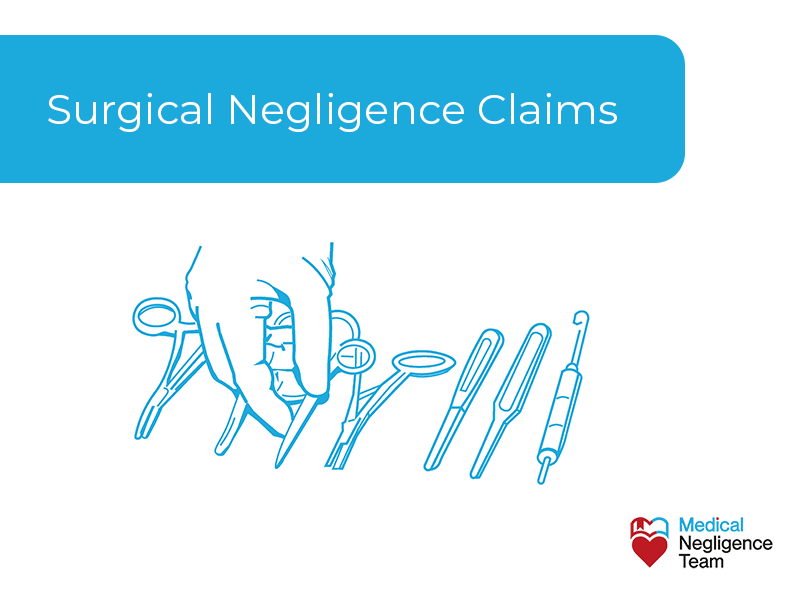
Once you notice the signs that your laser eye surgery has gone wrong, you must consider what to do next. The vital issue is to save your eyesight and to consult a medical professional as quickly as possible.
You should also make contact with a No Win No Fee medical negligence solicitor who will advise you on what to do and how to gather evidence of the laser eye surgery negligence.
Our Process
Our team members have a higher career win rate with a 75% success rate on NHS letters of claim, compared to an industry average of 54.5%.
Enquiry
The first step is to get in touch and tell us what went wrong. It’s free and easy. Call our 24-hour helpline: 0800 246 1122 or request a callback here.
Medical Evaluation
Once you have spoken with our team we’ll let you know how we can help. Typically the next step is to obtain your medical records for us to review.
Legal Letter
Once all your medical records have been received they will be reviewed by a medically & legally qualified member of our team. If there is evidence of negligence we will send a letter of claim to the negligent party outlining your compensation claim.
Evidence to prove negligence
Evidence to prove negligence in your eye surgery is crucial to getting a good and quick outcome in your case.
It is not enough just to say that the surgeon was negligent; you need to prove that their poor duty of care to you has caused damage to your eyes.
Evidence you need to prove negligence is:
When you have the evidence, the case for medical negligence compensation will come together, and you may be ready to make a claim for laser eye surgery negligence.
What can you claim for when you sue for laser eye surgery negligence?
You can claim compensation for any damages that occurred when you sue for laser eye surgery.
There are two types of compensation damages due when suing for any type of medical negligence: General damages and Special damages.
General damages
General damages are when you sue for the pain, suffering and loss of amenity, PSLA, you have experienced due to negligence.
Pain is that above what is normally expected for your procedure.
Suffering is the inconvenience and changes to your life that cause you discomfort.
Loss of Amenity is any difficulty you have in doing everyday tasks, such as walking, sitting, playing sports and sleeping.
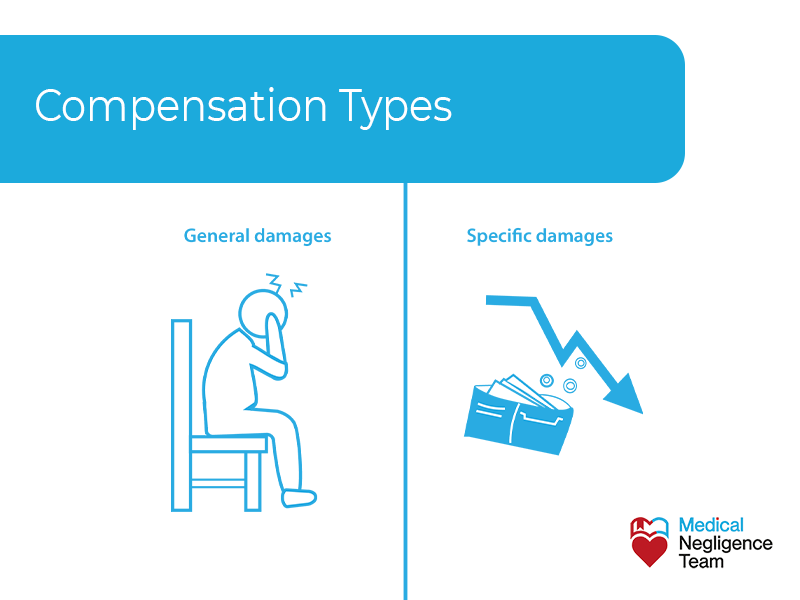
Special damages
Special damages include loss of earnings, future care costs, and out-of-pocket expenses.
Loss of earnings includes compensation for time off work and any reduction of your income in the future.
Future care costs are for any care you will need as a result of medical negligence.
Out-of-pocket expenses cover medical appointments, travel, accommodation and meals.
Be sure to keep payslips, receipts and proof of any losses you experience due to the medical negligence.
You deserve compensation to cover all losses, including loss of life, medical costs, and long-term care needs.
When you or a loved one suffers from the effects of laser eye surgery, you make a claim for laser eye surgery compensation.
Your No Win No Fee solicitor will guide you through the steps in making a laser eye surgery claim.
What are the steps involved in making a laser eye surgery claim?
The steps involved in making a laser eye surgery claim go from seeking medical advice to issuing court proceedings.
The steps are a part of any successful compensation case, and settlement can happen at any stage in the process.
Your medical negligence solicitor will do the rest when you follow the steps correctly and gather all the facts and figures.
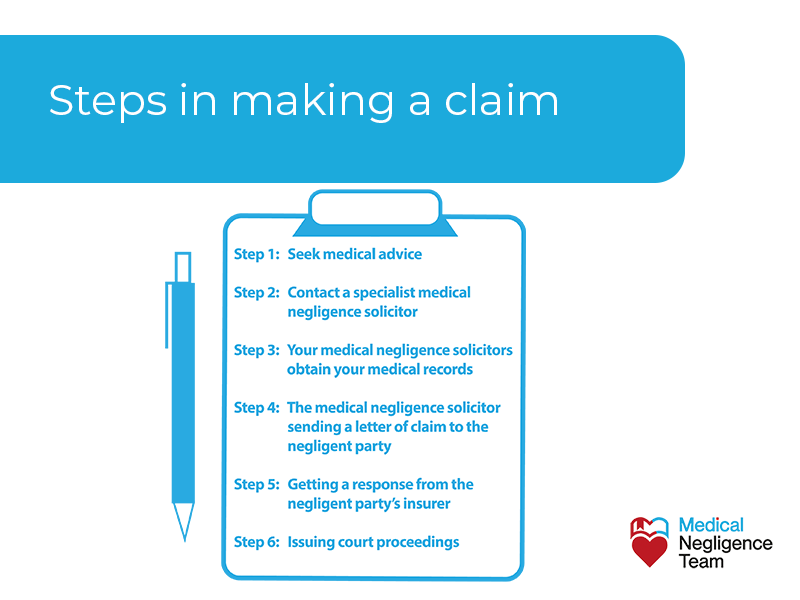
How long do I have to make a claim for laser eye surgery?
You have three years to make a claim for laser eye surgery. All medical negligence claims are subject to limitation periods.
For example, in England and Wales, medical negligence claims must generally be brought and court proceedings issued within three years of the injury or three years of knowledge of the facts giving rise to the laser eye surgery claim.
If someone has passed away, it is the date of death if the limitation period has not expired at the date of death.
Children not under a disability typically have until they reach 21 to start a laser eye surgery claim or court proceedings.
Persons with a disability, who lack capacity, are not subject to any limitation period.
Can I make a medical negligence claim against the NHS?
Yes, you can make a medical negligence claim against the NHS. Suing the NHS for negligence is not unusual. People sue the NHS for compensation for medical negligence and receive the money they deserve for the negligent treatment.
There are between 8,000 and 10,000 successful medical negligence claims against the NHS each year—amounts in compensation claims awarded against the NHS range from £1000 to over £10 million.
The amount of compensation you receive covers minor injuries such as scarring to serious life-threatening negligence, which leaves you with long-term care needs.
We trust in and use the NHS daily and do not expect negligence. It happens, though, and the NHS has a dedicated team to handle medical negligence compensation claims, called NHS resolution.
NHS Resolution has a responsibility to treat patients who seek compensation fairly. Patients pay for the NHS through their taxes, and for that they deserve respect and the best medical treatment.
Contact The Medical Negligence Team
Contact the Medical Negligence Team today to discuss your laser eye surgery claim for compensation. We have both the legal and medical experts to guide you along the steps to a successful medical negligence claim for compensation.
At the Medical Negligence Team, we fight every compensation claim on a No Win No Fee basis. You will not be out of pocket for an unsuccessful claim.
We have a very high success rate and a reputation for a speedy and successful resolution to all medical negligence cases.
Our 100% Compensation Guarantee puts all the money you win into your pocket. You or your loved one suffered laser eye surgery and deserve every penny of the compensation claim.
Contact us at the Medical Negligence Team for all your medical negligence needs.


